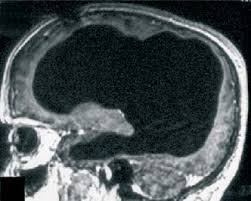There’s a common myth saying people only use 10% of their brains. This idea has been turned into films and the basis of self-help programs that promise to “unlock” your full potential. Neuroscientists have since debunked this myth, and PET scans show activity in the entire brain in real time. However, one French man is the only exception. Despite damage to 90% of his brain, he’s a fully functional medical miracle.
Abnormal Brain, Normal Man

The case study was originally published in the Lancet in 2007. The man’s identity was kept confidential, but he has been the subject of scientific intrigue ever since. At the time of the release, he was 44 years old, but had been born with a condition called chronic non-communicating hydrocephalus. This means he had a blockage in his cranial passages, leading to a slow buildup of cerebrospinal fluid that compressed the rest of his brain, explains John Hopkins Medicine.
However, the man lived most of his life without realizing anything was wrong. His condition was only discovered after he went to his doctor complaining about mild weakness in his left leg. Brain scans revealed his skull was filled with fluid aside from a thin outer layer of brain tissue. Doctors theorize his brain slowly eroded over the past three decades because of the build-up. He had been diagnosed with hydrocephalus as a baby and received a shunt treatment at age 6 months, which drained and redirected the fluid. However, the stent was revised when he was 14 after experiencing a side effect called ataxia, which causes muscular weakness in his left leg.
The miracle continued, as the man had otherwise normal medical records and neurological development throughout his life. He did test a lower-than-average IQ of 75 (his verbal IQ was 84, and his performance IQ 70). But he led a normal life. The 2007 publication titled “Brain of a white-collar worker” said he was a “married father of two children, and worked as a civil servant”.
Read More: Man Who Spent 10+ Years in a Coma Wakes Up To Tell an Unbelievable Story
A Groundbreaking Medical Miracle
61127-1/asset/2bb1a54c-8ef2-4b84-8658-55343a24b192/main.assets/fx1_lrg.jpg)
However, many people confused this study to mean he was “missing 90%” of his brain. But this is not the case. Although his brain is filled with fluid, the neurons that usually occupy that space may still be functioning. “This condition, in which the cerebrospinal fluid that fills the ventricles of the brain normally fails to properly evacuate and thus accumulates, is known to destroy the cell bodies of neurons as well as the white matter, that is the connections between neurons,” explains Axel Cleeremans, a cognitive psychologist from the Université Libre de Bruxelles in Belgium, to Snopes.
“But most of the neurons in this patient’s brain are probably compressed into the very fine residual layer. So the patient has lost many neurons, and those neurons that are left are compressed against the skull.” In other words, it’s an oversimplification to say a human being can live normally with only 10% of their brain, and still a total myth, according to the Association for Psychological Science.
What Creates Consciousness?

This medical miracle challenges two depthful scientific concepts: What does the body actually need to survive, and what does the body need to be conscious? A previously common theory suggested consciousness is linked to several brain regions, but this one man proves it otherwise. “Any theory of consciousness has to be able to explain why a person like that, who’s missing 90 percent of his neurons, still exhibits normal behaviour,” says Cleeremans in a 2016 interview with Quartz. All of the regions of the brain regarding language, vision, motion control, sensibility, etc. was reduced in the man, and yet he suffered no significant mental effects.
His case suggests that if brain injury occurs over an extended period of time, the body can adapt to it. Cleeremans believes the brain learns to be conscious through adaptation and development. Therefore, not many specific neural regions are needed. “Consciousness is the brain’s non-conceptual theory about itself, gained through experience—that is learning, interacting with itself, the world, and with other people,” he says. In other words, awareness is not about knowing information; it’s about knowing that you know information. As Cleeremans summarizes, consciousness is “the brain’s theory about itself.”
Read More: 21 Unbelievable Places That Look Like They’re From Another Planet

